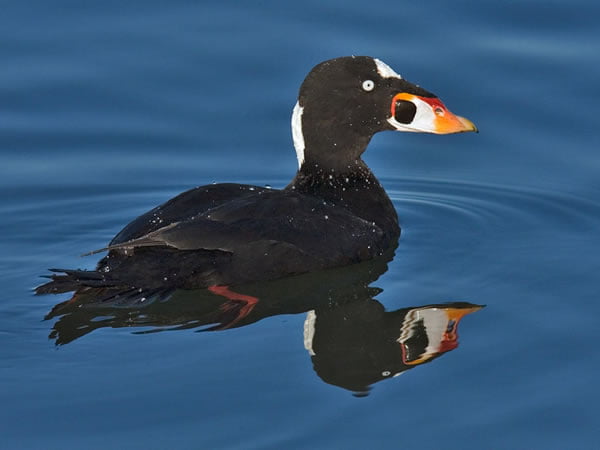Year Funded: 2002 (year endorsed)
Lead Institution(s): Canadian Wildlife Service
Project Lead: Dr. John Elliott
Collaborator(s): Laurie Wilson (CWS), Michael Ikonmou (DFO), Jim Maguier (NWRI), Frank Gobas (SFU), Judit Smit (WCVM), Malcome McAdie (BCWALP)
Location: British Columbia
Focal Species: Surf Scoter (Melanitta perspicillata)
Project Description: Breeding and wintering populations of several species of sea ducks, including surf scoters, have declined over recent decades in the Pacific Northwest, and there are no clear reasons for those declines. Large congregations of scoters winter in bays and harbours along the Pacific coast, including Puget Sound and the Strait of Georgia, and many of the sites are highly polluted. Scoters are long-lived birds and, therefore, have the capacity to accumulate contaminants. The objective of this study was to determine the exposure and effect of surf scoters to endocrine disrupting compounds acquired during the winter from the Strait of Georgia and assess the role of contaminants in population declines along the Pacific Coast. We collected surf scoters in December and again 4 months later (March) from Howe Sound (harbour) and Baynes Sound (reference site) to determine accumulation of contaminants during the winter period. Surf scoters were also collected from two other harbour sites (Burrard Inlet, Esquimalt Harbour) in late winter (February/March).
SDJV13 Final Report
Related Publications
Elliott, J. E., M. L. Harris, L. K. Wilson, B. D. Smith, S. P. Batchelor, and J. Maguire. 2007. Butyltins, trace metals and morphological variables in surf scoter (Melanitta perspicillata) wintering on the south coast of British Columbia, Canada. Environmental Pollution 149:114–124. https://doi.org/10.1016/j.envpol.2006.10.044
Harris, M. L., L. K. Wilson, S. F. Trudeau, and J. E. Elliott. 2007. Vitamin A and contaminant concentrations in surf scoters (Melanitta perspicillata) wintering on the Pacific coast of British Columbia, Canada. Science of The Total Environment 378:366–375. https://doi.org/10.1016/j.scitotenv.2007.02.013
Wilson, L. K., M. L. Harris, S. Trudeau, M. G. Ikonomou, and J. E. Elliott. 2010. Properties of Blood, Porphyrins, and Exposure to Legacy and Emerging Persistent Organic Pollutants in Surf Scoters (Melanitta perspicillata) Overwintering on the South Coast of British Columbia, Canada. Archives of Environmental Contamination and Toxicology 59:322–333. https://doi.org/10.1007/s00244-010-9486-5
